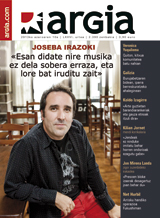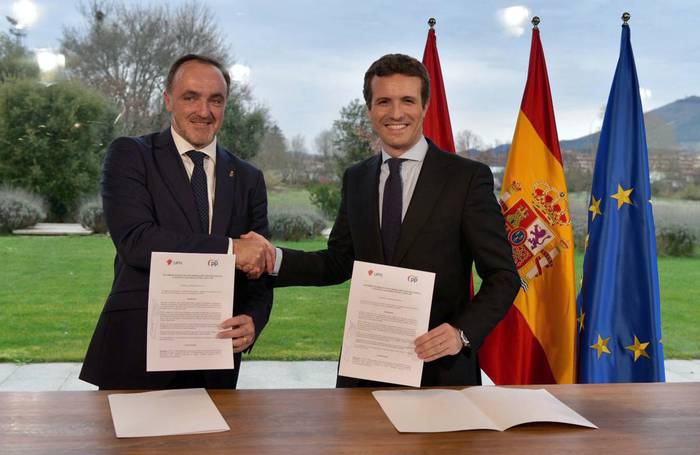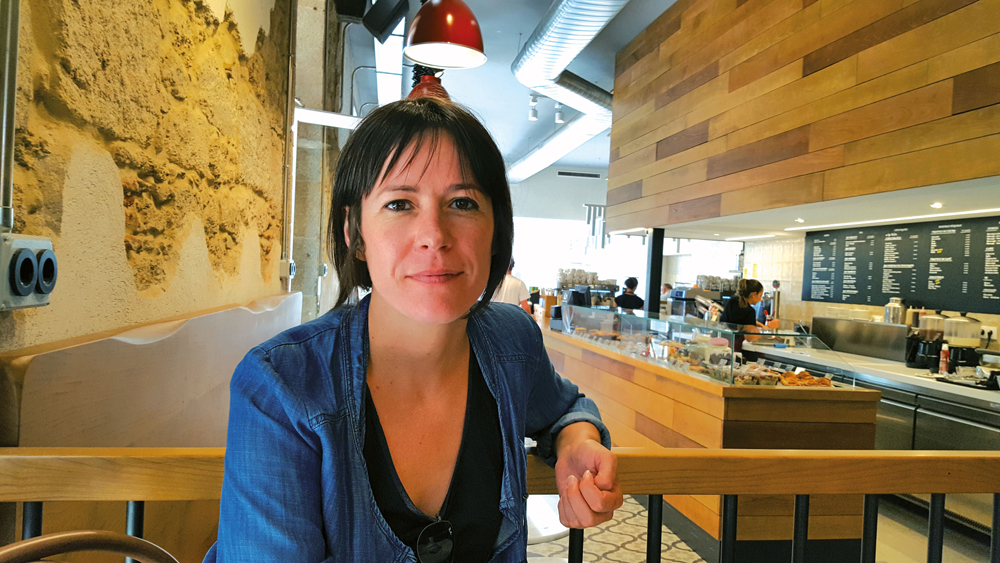Trying to find the way
- Galician nationalism wants to overcome the drift of the last BNG cada.El, the leading nationalist referent, is trying to recover the north on the path of sovereignty at a time when pp is applying the “Spain more” policy. The environment experienced by the nationalist parties is the state. On the contrary, internal division and historical weakness.
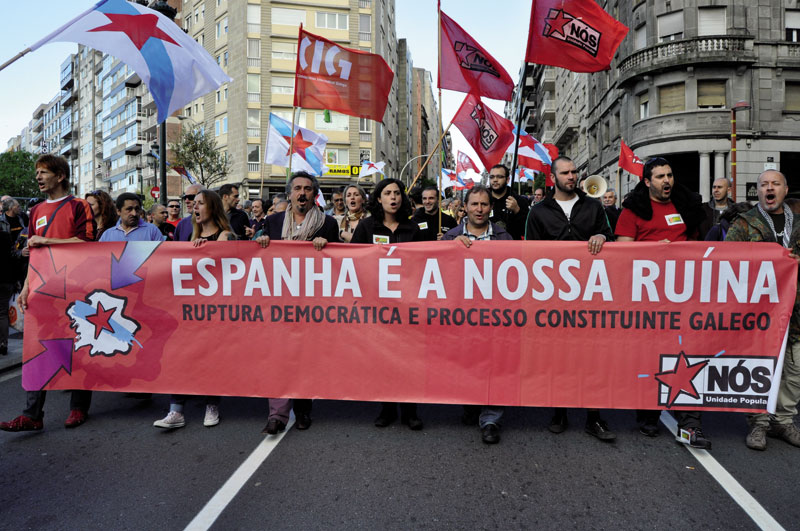
In the midst of the debate on independence, thanks to the winds of Catalonia, two forces face each other at the other end of the Spanish State, in Galicia. It is not about emerging forces, but about increasing the traditional positions of both. On the one hand, pp is more Spanish than ever before. Aside from the disgust and softer attitudes of the Fraga era, the popular use an aggressive discourse towards Galician nationalism, and if evil was nothing more than an average discourse. Pp, both in Santiago de Compostela and in Madrid, is making a great effort to avoid the third national problem. Among other things, through a new invented concept of “Galician terrorism”.
On the other side of the ring is Galician nationalism. Its main historical reference, the BNG, is returning and overcoming the radical positions of its beginnings. Not only with regard to sovereignty: the Left has also left behind the ambiguity of a time not so far away, which, on the other hand, has been fostered by the context of crisis. This is a given process in the last four years, which many have described as "accelerated."
The BNG has approached, among others, the smaller but very active groups that have resisted the demand for independence. In Galicia the word “independence” is a slippery word, and so far very few have normally integrated it into the core of their discourse. The largest Basque parties, the BNG and the newborn Anova, are more in favour of using another terminology. Thus, in Galicia, the distinction between independence and nationalism is made with total normality. However, reality is much more complex than what the previous couple of sentences suggest.
The word independence doesn't sell well.
The first thing to clarify is that within BNG and Anova there is independence, not as a vague feeling, but in concrete structures. In order not to be lengthened in vain by technical explanations, and even to the detriment of precision, let us say that both sides accept double militancies and organized internal currents. One of them is the MGS (Movemento Galego ao Socialism) which has been officially in existence since 2009 within the BNG. According to Rafa Vilar, a member of the management, the fact that the BNG was detached from the original left and abertzal approaches caused discomfort in several militants and that is precisely why they created the MGS.
“The BNG had turned its back on the question of sovereignty and framed the discourse – says Vilar- to the statutory framework, and knew that, in view of what happened with the Ibarretxe Plan and the Catalan Statute, we would not get anywhere along that path.” In the period mentioned by Vilar, it seemed that only under certain abbreviations from outside the BNG and with few forces (Snó-UP, Galiza Cause, FPG, currently in Anova...) could be found Galicians for independence, “but we were clear that in our country there was the majority of independentists, even if they were hidden”. The word still has a taboo tone, but it can be said that the birth of the MGS has not been in vain, as the BNG has speeded up its discourse in favor of sovereignty.
It is precisely Xavier Vence, the national spokesman for the BNG, who shouted from "independence, independence" the first words after taking office at the national assembly last March. According to the chronicle of the digital publication Praza pública, this slogan had not been heard for a long time at a congress of the BNG. However, it is not a word to use every day, at least in what Vence tells us: "In Galicia, to put it in some way, we have a low intensity nationalism, and the demands are not expressed as explicitly as in Catalonia. Many of the nationalist voters, whether from the BNG or from another party, do not consider themselves independent. They think of Galicia, they vote in favour of its identity and interests, but they do not remember independence. There is a significant difference with the Abertzales of other countries.” The BNG therefore prefers to speak of sovereignty rather than independence.
Causes of weakness
The fact that nationalism in Galicia is less strong than in Euskal Herria and Catalonia is due to several factors. On the one hand, Galicia has been under Spanish rule for a longer time: “Euskal Herria lost strength in the 19th century and Catalonia was stripped of national rights in 1714. We, on the other hand, have been under the control of the Spanish crown since 1492,” explains Carlos Morais, members of the independence organization Nós-UP (Nos-Unidas Popular). “Secondly,” he added, some of the Welsh elites were replaced by those from Spain, which took the territory off. Those who send have always refused to develop their own political project.” That explains one of the peculiarities of Galician nationalism: it is almost entirely on the left.
The absence of an Abertzale bourgeoisie has not favored Galician nationalism. At least this is the view of Suso Seixo, Secretary General of the Abertzale CIG trade union: “The existence of right-wing nationalism would help to raise awareness among sectors that have a significant role in society.” By the way, we added, it would take the PP out of power.
Seeking to bring together forces for sovereignty
The popular are proud of their passage through Galicia. “Everyone who has a Galician character is being attacked more strongly than ever before – says Séix-, at least in the age of Fraga they did.” It is worth mentioning the measures taken against Galician once power was restored in the Xunta in 2009 and the massive response given to them on the street. However, that demonstration of strength that could be used for the benefit of patriotism had gone into vain. "The lost opportunity," says Paula Ríos, member of the feminist and independentist association Mulheres Nationalista Galegas. “That force was lost in the hole of division between the Basque groups,” Ríos laments.
The Galiza pola Soberania (GpS) platform, one of the founders of Vitor Vaqueiro, has just been born with the aim of overcoming division and uniting forces for sovereignty. “In these surveys of feelings of nationality, a percentage close to 30% responds to patriot status,” explains Vaqueiro. But that is not the force reflected in the elections. “We want to reach those who abstain, not to vote, but to mobilize for sovereignty.” GpS is trying to distance himself from the usual language of political parties. The aim is to pay attention to the elements of identity that remain outside the political agenda and to enhance the Galician imaginary. For example, Apalpador, the Galician equivalent of Olentzero.
In any case, the GpS has an obvious political character. Its founding manifesto indicates the final objective of the initiative: the establishment of an independent Galician republic. The same objective that the BNG has recently approved. No wonder. The GpS involve individuals and not associations or parties, but to a large extent it is a platform driven by the BNG. It should also be pointed out that most areas of nationalism and independence are present in it. The most spectacular gap is that of Anova members.
Why not Galiza pola Independencia? On the one hand, like Xavier Vence, he talks about the need to make a careful selection of words to go to Galician society. But he adds another point of view: “There are Greece and Portugal, for example, independent, but not sovereign at all at the moment. I could say that sovereignty is a broader concept and includes independence. Not the other way around.”
Anova vs. the rest
The party led by Xose Manuel Beiras was set up last year by a number of sectors that left the BNG. Since then, the disagreement between the BNG and Anova has been the main sign of the fragmentation of Galician nationalism. Or, when we are, the disagreement between Anova and everyone else, because it has to be borne in mind that nowadays, independence organizations feel much closer to the BNG, which until recently reproached him for the fact that tibieza was lost on the surface of autonomy. In any case, everyone is harshly critical of Anova’s sin: that of joining a party that has its field of work throughout the state for the last Galician elections. Specifically, with the Esquerda Unit (EU), i.e. with the Galician part of the United Left. The sum of both – there is also Equo and Eco-Socialist Hoop with few forces in the coalition – is called AGE, the Galician Alternative of Esquerdas, and it came as a great surprise in these elections, as it got nine Members – five EU, four Anova – above seven of the BNG.
Xose Manuel Beiras, as well as spokesperson for Anova, is from the AGE. In their view, many nationalists have welcomed unity with the EU: "According to post-election surveys, more than 60% of the AGE votes were Basque. The breaking of the tradition of not meeting with the forces of the state has not taken us away, and has not weakened nationalism, as the BNG accuses us. On the contrary, it was the BNG that lost many votes.”
The process of preparing candidates for the 2014 European elections has increased the debate. The BNG and the independentists are not prepared to accept a party like that of the EU in a closed candidature to Galise. For his part, Anova wants to make a proposal of unity to all, “both the Basque parties and the leftist parties that are willing to recognize the right to decide the Galician nation,” said Beiras. Anova is in favour of forming a left-wing candidate from all over the state, including UI, if he is willing to recognise that there are four nations in the state – the fourth would be Spain – and recognises that each of the four is a political subject with the right to decide. According to the politician born in Santiago de Compostela, Esquerda Unidas has taken this step, since on 24 July the AGE made it public but in a communiqué that had little impact due to the serious train accident in Angrois recognized the right of self-determination of Galicia. Evidently, it is more difficult to bring UI, “because, among other things, in the Basque Country they have problems”. However, Xose Manuel Beiras points out that in the top management body of UI, the majority are willing to accept the approach of the four nations; that is, at what rate. “The message that is spreading is that we Galicians can’t do it on our own,” the rest of the abertzales accuse Beyas. And a question in everybody's minds. will it be possible to celebrate jointly next year’s Fatherland Day (24 July)?
90eko hamarkadaren hasieran Exército Guerrilheiro do Povo Galego Ceive (EGPGC) desegin zenetik ez da egon Galizian erakunde armatu antolaturik –Estatuko segurtasun indarrak alde batera utzita, noski–. Haatik, independentziaren aldeko ekintza armatuak, sekula ez pertsonen aurkakoak, EGPGCren aurretik zein ondoren egon dira.
XXI. mendea ez da salbuespena izan. Hainbat lehergailuk eztanda egin izan dute Galizian azken urteotan, besteak beste alderdi politiko espainiarzaleen egoitzetan, eta ekintzon erantzukizuna aldarrikatzeko idazkietan Resistencia Galega leloa, edo sinadura, nondik begiratzen den, erabili izan da. Izen hori duen erakunde baten zantzurik ez dago, baina PP baliatzen ari da mozioak aurkezteko, bai Espainiako Senatuan, baita Galiaziako parlamentuan eta udaletxeetan ere. Ohiko bidetik, terrorismoa gaitzestea eskatzen du Alderdi Popularrak. BNG ez da jokoan sartu eta mozioen aurka bozkatzen ari da. Bide bera ari da urratzen AGE, Anovak eta Esquerda Unidak Santiagoko parlamentuan daukaten koalizioak. Garbi esan dute batzuek zein besteek: Galizian terrorismo arazo bat dagoela esatea astakeria hutsa da.
Momentuz, kontua ez da mozioetatik harago joan, baina komeni da gogoratzea Espainiako Estatuan Alderdien Lege bat dagoela, Euskal Herrirako ad hoc sortua izanagatik PPri primeran etor dakiokeena orain Galizian. Hain urrun joango ez balira ere –BNG eta Anovako ordezkariak lasai agertu dira mehatxu horrekiko– Resistencia Galegaren aitzakia galiziar abertzaletasuna, eta zehazki independentismoa, “hots, pentsamendu hutsa” kriminalizatzeko baliatuko dutela salatu du Ceivar (Askatu, galegoz) errepresioaren aurkako elkarteak. “Espainiako Entzutegi Nazionalak irailean lau militante independentistari ezarritako neurriz kanpoko zigorrak ere adierazten du PPren Gobernua noraino dagoen bere estrategia gogortzeko prest”. Horrexegatik hain zuzen, izen-abizenak ezkutuan gorde nahiago izan du gurekin berba egin duen Ceivarreko kideak.
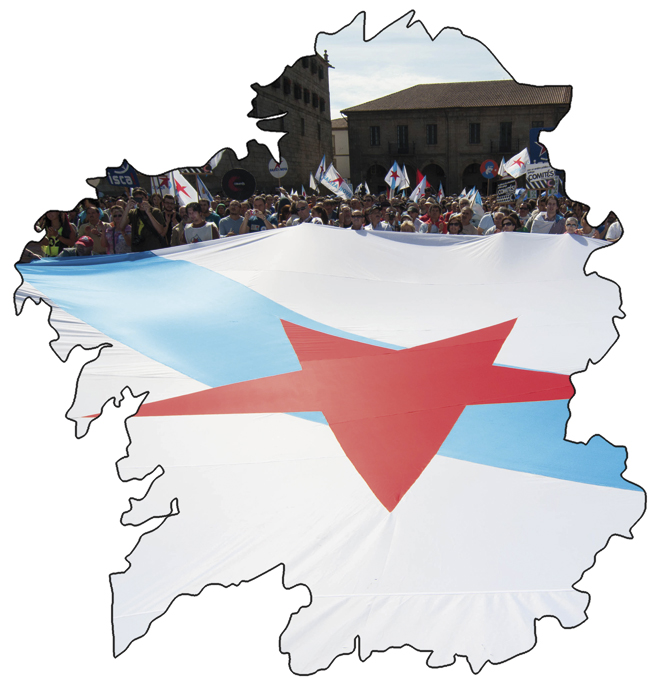
Edozein galiziar abertzalek esango dizu goiko mapa ez dela, berez, Galizia osokoa. Falta den zatia behekoan duzue ikusgai. Ekialdeko lurraldeak dira, historiaz, kulturaz eta hizkuntzaz galiziarrak baina aspalditik Galizia ofizialetik kanpo. Eo-Navia, Berzo, Seabra... Eskualde horiek gaur egun Asturias edo Gaztela eta Leongo autonomia erkidegoen barruan daude, eta ezin esan “galiziartasuna” biziro indartsua denik han. Galiza irredenta edo Galiza estremeira esaten zaie lurraldeoi.
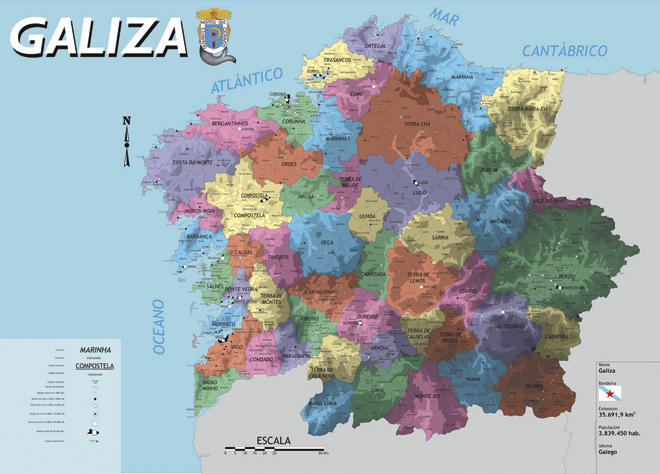
Nós-UPren Vigoko egoitzan izan genuen mapa honen berri, Carlos Moraisekin berbetan ari ginela. Izan ere, Nós-UPk egina eta argitaratua da. “Hau da lurralde osoa, anputaziorik gabe, erakusten duen mapa bakarra”. Interneten aurkitu daitezkeen beste batzuetan ere ageri da Galiza irredenta, baina hagitzez bertsio murritzagoan. Bestalde, Nós-UPren mapak ez du 1833tik indarrean dagoen probintzia banaketa ofiziala jasotzen, eskualdekakoa baizik. Historikoa, Moraisen esanetan.
Galiziar abertzale ororen gogoan dago Galiza irredenta, baina oso talde gutxiren agendan dauka lehentasuna. Besterik gabe, hor dagoen zerbait da. Esparru nazionalista galiziarrean autonomia erkidegoaren mapa ofiziala darabilte gehientsuenek, BNGk eta Anovak barne. Ez dago eskaririk lurralde irredentoak Galizian txertatzeko, dokumentu batzuetan aukera hori aipatu arren. FPG alderdi independentistako Mariano Abaloren esanetan, “abertzaleon kontzientzian lur horiek egon badaude, baina oinarrizkoena lortu ezean, alegia, gaur egungo erkidego autonomoak erabakitzeko eskubidea edukitzea, nekez emango da haragoko urratsik”.
Uztailaren 3an eta 4an, Bizitzeko Eskubidearen aldeko Nazioarteko Mintegian bildu dira hainbat parlamentari Madrilgo Diputatuen Kongresuan. Alboko aretotik, emakumeen elkarteek eta oposizioko alderdiek ezetz esan diete, ez dutela abortuaren lege erreforma onartuko.
Prestige petrolio-ontziko hondamendiaz 11 urte igaro direnean itxi da auzia, errudunak salbuetsita. Coruñako lurralde auzitegiak eman du azken ebazpena eta erantzukizunik gabe utzi ditu ingurumenaren aurkako delituagatik akusatutako hiruak eta Espainiako Gobernua bera,... [+]
PP, PSOE eta UPyD alderdiek ezezko borobila eman zioten Kongresuan herrien autodeterminazio eskubideari. Amaiur koalizioak, Kataluniako ERC-k eta Galiziako BNG-k eramandako erabakitzeko eskubidearekin lotutako legez besteko proposamena eztabaidagai izan zen atzo Madrilgo... [+]
Amaiur koalizioak, Kataluniako ERC-k eta Galiziako BNG-k autodeterminazio eskubidearen gaia eramango dute gaur Madrilgo Kongresura, legez besteko proposamen baten bidez. Erreferendumak antolatu ahal izatea bozkatuko dute diputatuek.
Espainiako Kongresuko 31 diputatuk eta Senatuko 13 kidek Parot doktrina izenez ezagunagoa den 197/2006 doktrinaren aurkako manifestua sinatu eta Giza Eskubideen aldeko Nazio Batuen goi-komisarioari bidali diote, doktrinak "legedia penalaren eta segurtasun juridikoaren... [+]









